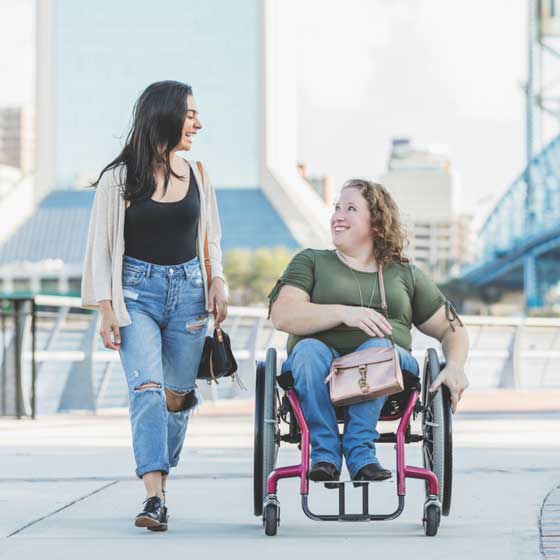Funding sources
Understanding funding schemes
Support for living with Spinal Cord Injury
People with disability have the same right as other Australians to achieve their goals, to remain well, and to decide their own lifestyle and interests. Receiving appropriate funding is important in making these things happen.
With several other funding schemes in operation, it is important to understand which scheme best meets your needs, the eligibility criteria required, and how clinical assessments and advice can assist you in getting the best from your funding.

I want to know more about:
National Disability Insurance Scheme
In summary:
- Available nationally
- Entry open to people with ‘permanent and significant disability’ aged under 65 at the time they enter the scheme
- Funding is provided directly to the individual
- Participants choose their own services and supports
- Participants may choose to manage their own plans or appoint a plan manager
- Plan reviews are usually conducted annually and funding continues for life
- Managed by the National Disability Insurance Agency
Lifetime Care and Support Scheme (LTCS)
The Lifetime Care & Support Scheme (LTCS) is administered by iCare, an agency of the NSW Government set up to manage compensation and insurance schemes. LTCS provides treatment, rehabilitation and care services to people severely injured in motor accidents in NSW. Support and care are provided regardless of who was at fault in the accident, if the person meets the eligibility criteria for their injury.3
Adult participants in this scheme must have been injured in an accident in NSW on or after 7 October 2007 – for children under 16, this is 1 October 2006. Participants are allocated an iCare coordinator who can assist in choosing a case manager. The case manager will assist you to choose supports and will submit requests for funding to iCare.
Severe injuries covered by LTCS are:
- Spinal Cord injury
- Brain Injury
- Amputation
- Burns
- Permanent blindness
Each of these injury categories has its own criteria, which are available on the iCare website.
A medical specialist must provide documentation regarding the severity of your injuries. Your spinal specialist, hospital or rehabilitation team will be able to assist you with this.
iCare applies a ‘reasonable and necessary’ requirement to the care and supports provided, in much the same way as the NDIS. People accepted onto the scheme are ‘interim’ participants for the first two years. After this time, you may apply to become a permanent participant, with supports provided across your life.
iCare have also introduced changes to services to assist participants during COVID-19.
Disability Support for Older Australians (DSOA) Program
DSOA was introduced from 1 July 2021 and has replaced the Continuity of Supports (CoS) program.
DSOA is a funding program that provides support to older people who are not eligible for NDIS and who were receiving state-managed specialist disability services at the time the NDIS rolled out in their region. The program essentially means that you continue with your current provider and receive support equivalent to your current services.
This is a closed program, which means that only people receiving supports through the COS program (as at 1 July 2021) will receive supports through DSOA.
If you are eligible for DSOA funding, contact us at Forward for more information on how we can support you.
My Aged Care
My Aged Care is administered by the Commonwealth government and provides home care and residential care for people aged 65yrs or older. Aboriginal and Torres Strait Islander people are eligible at age 50.
You may be eligible for aged care if there are cognitive or physical changes impairing what you can do, or changes in family care arrangements or recent hospitalisation. To know if you are eligible you will need an assessment. This is carried out by the Aged Care Assessment Team (ACAT) connected with your local health district.
If you have a complex disability such as spinal cord injury, it is important to receive care and support under the most appropriate funding scheme.
It is important to discuss all options and benefits available to you including the Disability Supports for Older Australians Program prior to deciding to use the My Aged Care scheme. ParaQuad’s Clinical Services team can help you with this.
If your ACAT assessment determines that you’re eligible for My Aged Care, you will be placed on the waiting list for a home care package at one of four levels. Level 4 provides the highest level of funding and support.
My Aged Care website provides full information on assessment, eligibility, costs and processes. Again, COVID-19 updates and information are available.
How our clinicians can assist you
These schemes require or support the use of an appropriately qualified health professional to help you identify the most appropriate consumables, equipment and services to meet your needs. Inappropriate service, consumable or equipment use may be detrimental to your health and wellbeing.
For almost 60 years, Forward has worked with people impacted by spinal cord injury and other neurological conditions. Our team of experts includes Occupational Therapists and Clinical Nurse Consultants who can work with you to provide health support assessments and other tailored services to get the best for you.
These services include:
- Continence assessment and prescription
- Wound care assessment and prescription
- Respiratory equipment prescription
- Consumable prescription
- Assistive technology assessment prescription
- Complex seating
- Digital pressure mapping
- Carer training
Got a question?
Talk to us for more information about our services and how we can help you.